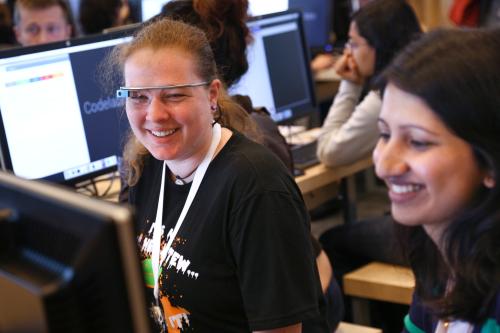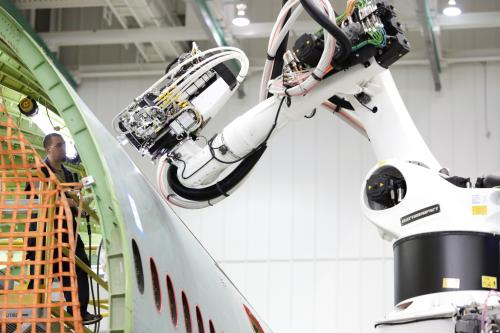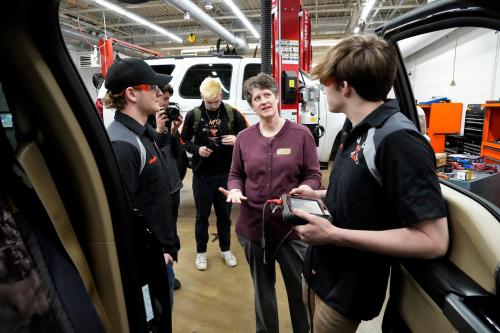Emerging technologies such as fifth-generation (5G) wireless networks, artificial intelligence, and advanced robotics promise to transform most sectors of the economy. Many jobs are becoming more technology-intensive, and all workers will need some baseline technology skills as a result. To discuss how workers can meet the changing skills demands of the digital economy, the Center for Technology Innovation hosted a panel discussion on April 12 with Brookings scholars Darrell West and Makada Henry-Nickie, David Hoffman of Intel, and Greg Morrisett of Cornell University. The conversation covered the changing needs of employers, different models for training workers, and public policies that can help employers and workers alike adapt to emerging technologies.
New training models
Makada Henry-Nickie began with the results of recently published Brookings research on the state of the information and communication technology workforce. According to the Bureau of Economic Analysis, the digital economy contributed 6% of GDP in 2017, but only 3.3% of total employment. How can we increase employment in the digital economy along with its output? To accomplish this task, the panelists emphasized the need to combine training in technology with other fields. Ensuring that students in STEM fields have soft skills like communication is as equally important as training students outside of STEM with in-demand hard skills. The College of Arts and Sciences at Cornell recently approved a requirement that all undergraduates take a data science course. Increasingly, employers are looking for hard skills in addition to the soft skills represented by a college degree.
Training for jobs in the digital economy cannot come from higher education alone, since most U.S. workers do not have a college degree. Even among college graduates, 44% of millennials do not believe that attending college was worth taking on student loans. In particular, it has become more difficult to find jobs that pay down growing amounts of student loan debt. Additionally, some types of white-collar jobs requiring a college degree are themselves vulnerable to automation. Fortunately, younger workers are also more accepting of the idea that they will need to learn new skills periodically in order to advance in their careers. The next challenges will be how to pay for continuous skills training and guarantee that employers honor the credentials earned by their employees.
Public policy options
Paraphrasing Charles Darwin, Darrell West suggested that the most adaptable workers will thrive in the new economy. Emerging technologies place a premium on adaptability, but some workers will not be able to adapt. In addition to encouraging skills training throughout life, public policies must address the needs of workers unable to make a career transition. West added that it was government rather than technology itself that most worried him about the digital economy, and that better governance capacity is needed to deal with economic change. New policies such as a universal basic income have been promoted as a means of helping workers manage this transition, although expanding existing programs like the Earned Income Tax Credit can also help.
During the Industrial Revolution, labor unions formed to set rules for working in new industries—will labor unions make inroads in new fields created by emerging technologies? Many labor laws were written for industrial economy jobs, and relatively few have been written for the digital economy. So far, new business models make it harder for workers to organize themselves into unions. A rise in contingent employment from gig-economy jobs leaves workers with little benefits, job security, or opportunity for collective bargaining. However, workers classified as independent contractors have challenged their job classification in court to earn the same benefits as full-time employees. In a future where workers update their skills and change jobs more frequently, unions could focus on guaranteeing the mobility of benefits along with workers.
The issue of preparing a workforce with new skills will persist as long as employers continue adopting emerging technologies like artificial intelligence and robotics. Going forward, employers and educators must find ways to train workers and upgrade their skills as necessary, and policymakers must help workers adapt to the realities of the digital economy.
Intel is a general, unrestricted donor to the Brookings Institution. The findings, interpretations, and conclusions posted in this piece are solely those of the author and not influenced by any donation.










Commentary
New training models and policies for a digital economy workforce
April 18, 2019